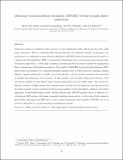| dc.contributor.author | Chung, Hyung Won | |
| dc.contributor.author | Swaminathan, Jaichander | |
| dc.contributor.author | Warsinger, David Elan Martin | |
| dc.contributor.author | Lienhard, John H | |
| dc.date.accessioned | 2016-11-18T22:56:00Z | |
| dc.date.available | 2016-11-18T22:56:00Z | |
| dc.date.issued | 2015-09 | |
| dc.date.submitted | 2015-07 | |
| dc.identifier.issn | 03767388 | |
| dc.identifier.uri | http://hdl.handle.net/1721.1/105371 | |
| dc.description.abstract | Multistage membrane distillation (MD) systems can have significantly higher efficiencies than their single stage counterparts. However, multistage MD system design has received limited attention. In this paper, the performance of a multistage vacuum membrane distillation (MSVMD) which is thermodynamically similar to a multi-stage flash distillation (MSF) is evaluated for desalination, brine concentration, and produced water reclamation applications. A wide range of solution concentrations were accurately modeled by implementing Pitzer's equations for NaCl-solution properties. The viability of MSVMD use for zero liquid discharge (ZLD) applications is investigated, by considering discharge salinities close to NaCl saturation conditions. Energy efficiency (gained output ratio or GOR), second law efficiency, and the specific membrane area were used to quantify the performance of the system. At high salinities, the increased boiling point elevation of the feed stream resulted in lower fluxes, larger heating requirements and lower GOR values. The second law efficiency, however, is higher under these conditions since the least heat for separation increases faster than the system's specific energy consumption with increase in salinity. Under high salinity conditions, the relative significance of irreversible losses is lower. Results indicate that MSVMD systems can be as efficient as a conventional MSF system, while using reasonable membrane areas and for a wide range of feed salinities. Given MD's advantages over MSF such as lower capital requirement and scalability, MSVMD can be an attractive alternative to conventional thermal desalination systems. | en_US |
| dc.description.sponsorship | MIT & Masdar Institute Cooperative Program (Reference No. 02/MI/MI/CP/11/07633/GEN/G/00) | en_US |
| dc.description.sponsorship | Massachusetts Institute of Technology. Department of Mechanical Engineering (Rohsenow fellowship) | en_US |
| dc.language.iso | en_US | |
| dc.publisher | Elsevier | en_US |
| dc.relation.isversionof | http://dx.doi.org/10.1016/j.memsci.2015.09.009 | en_US |
| dc.rights | Creative Commons Attribution-Noncommercial-Share Alike | en_US |
| dc.rights.uri | http://creativecommons.org/licenses/by-nc-sa/4.0/ | en_US |
| dc.source | Prof. Lienhard via Angie Locknar | en_US |
| dc.title | Multistage vacuum membrane distillation (MSVMD) systems for high salinity applications | en_US |
| dc.type | Article | en_US |
| dc.identifier.citation | Chung, Hyung Won, Jaichander Swaminathan, David M. Warsinger, and John H. Lienhard V. “Multistage Vacuum Membrane Distillation (MSVMD) Systems for High Salinity Applications.” Journal of Membrane Science 497 (January 2016): 128–141. | en_US |
| dc.contributor.department | Massachusetts Institute of Technology. Department of Mechanical Engineering | en_US |
| dc.contributor.department | Rohsenow Kendall Heat Transfer Laboratory (Massachusetts Institute of Technology) | en_US |
| dc.contributor.mitauthor | Lienhard, John H. | |
| dc.contributor.mitauthor | Chung, Hyung Won | |
| dc.contributor.mitauthor | Swaminathan, Jaichander | |
| dc.contributor.mitauthor | Warsinger, David Elan Martin | |
| dc.relation.journal | Journal of Membrane Science | en_US |
| dc.eprint.version | Author's final manuscript | en_US |
| dc.type.uri | http://purl.org/eprint/type/JournalArticle | en_US |
| eprint.status | http://purl.org/eprint/status/PeerReviewed | en_US |
| dspace.orderedauthors | Chung, Hyung Won; Swaminathan, Jaichander; Warsinger, David M.; Lienhard V, John H. | en_US |
| dspace.embargo.terms | N | en_US |
| dc.identifier.orcid | https://orcid.org/0000-0002-2901-0638 | |
| dc.identifier.orcid | https://orcid.org/0000-0001-8375-2694 | |
| dc.identifier.orcid | https://orcid.org/0000-0003-3446-1473 | |
| dspace.mitauthor.error | true | |
| mit.license | OPEN_ACCESS_POLICY | en_US |
